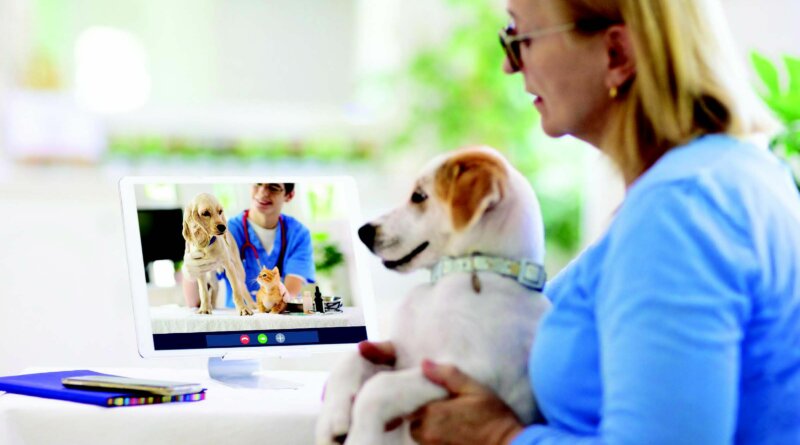The Emergence of Veterninary Telehealth – Dogster
The veterinarian will see you now — any time of the day or night. But the two of you may not be in the same exam room or even in the same city or state.
Welcome to the fast-growing brand of veterinary medicine — telehealth. Think of it as the House Call Version 2.0. But instead of the veterinarian stepping into your home — or you traveling to the veterinary clinic, your dog is diagnosed and a care plan is quickly created by a veterinarian during a live video call with you.

Why the Rise in Popularity
Fast. Convenient. And definitely on the rise. What is fueling the popularity of telehealth medicine for pets?
“No doubt that this pandemic with pet ownership now at record numbers has jumpstarted telemedicine and video conferencing,” says Courtney Campbell, a board-certified veterinary surgeon and chief creative officer of Vet Candy. “Look for more and more pet parents getting information directly from veterinarians on the Internet, video calls and certain portals versus actually going to the veterinary clinics to talk with their veterinarians in person.”
Beke Lubeach, general manager of DOGTV, recently relocated from Arizona to San Diego with her dogs, Walter and Payton. “A couple of times during COVID lockdown, there were some small concerns I had with my dogs and I was able to rectify via telehealth,” she says.

Others, like Isabel Alvarez Arata, have relied on veterinary telemedicine for their dogs because they live in areas that do not have holistic veterinary providers.
“I’m a big fan of veterinary telemedicine because it gives us access to veterinarians outside our area and also keeps pets home where they are most comfortable unless there is a need for an in-person visit,” says Isabel, a former professional pet sitting company owner who now hosts the Covered in Pet Hair podcast on Pet Life Radio.
As many pet parents can attest, health issues with dogs do not always occur during workday hours. When after-hour “uh-ohs” occur — such as your dog throwing up at 1 a.m. — you may feel that your only safe option is to drive your sick dog to a veterinary emergency care hospital. But the bill is often pricey and your pet’s primary veterinarian was not involved in the diagnosis or treatment.
“In reality, we have found that about 80% of the visits to the ER hospital are not really emergencies,” says Jeff Werber, DVM, who founded Airvet with his son, Brandon Werber in 2018. “Airvet has been a game changer in veterinary medicine. Clients have access to affordable care 24-7 and we work with their veterinarians. Clients love having access to talk to veterinarians one-on-one any time of the day or night.”

Other major players in the veterinary telehealth trend include Dutch and Fuzzy. Dutch was co-founded by Joe Spector and Brian Evans, DVM, and focuses on pets with chronic conditions, such as anxiety and allergies. As of press time, membership is available in 16 states (and growing) and includes free shipping on medications.
“We chose to launch Dutch with a focus on behavior and dermatology issues to start,” says Dr. Evans, because the two issues are very amenable to telemedicine. “Dutch is reaching its goal of providing a modern solution to vet care by allowing pet parents to have a more immediate means of finding comfort for their pets from issues such as anxiety and allergies — issues often left under treated or untreated.”
Fuzzy co-founders Eric Palm and Zubin Bhettay were motivated to create this telemedicine company in 2016 after Zubin rushed his dog, Mo, to an emergency vet hospital. After what he called “seven stressful hours,” he was billed $2,500 and later learned that his dog’s luxated patella could have been treated at home.
“Fuzzy is designed to put pet parenting on autopilot and remove the stress, uncertainty and worry by connecting pet parents with veterinary profes-sionals fast — rather than relying on expensive, in-person emergency visits or diagnosis via Dr. Google,” says Harley Butler, chief marketing officer. “Fuzzy’s 24/7 Live Vet Chat and video consults give pet parents immediate access day or night for any pet health questions they may have or guidance they may need.”

Why and When it Makes Sense
Even before the COVID-19 pandemic, many veterinary practices saw the value of adding telemedicine to their service options.
“We do tons of telehealth appointments,” says Dr. Lisa Radosta, a board-certified veterinary behaviorist and owner of Florida Veterinary Behavior Ser-vice in West Palm Beach. “Scared dogs don’t have to ride in the car as often. We can observe them in their home environment, and it is convenient for pet parents so they don’t miss their rechecks. That means that their dogs get better care.”
Telemedicine does not come without risks, as in any type of medicine practiced. There can be adverse drug interactions or missed diagnoses due to poor imaging transmissions.
Still, many, including Amy Shever, founder of 2nd Chance 4 Pets, embrace veterinary telemedicine.
“There are so many reasons telemedicine makes sense for pet owners who don’t have access to local vet care or specialists and to offer phone consults to determine if a pet needs to be seen by a veterinarian or a specialist and for pet owners who have mobility issues and need virtual pet care support,” she says.

Veterinary Telemedicine in Your State
Depending on your state laws, telemedicine providers can evaluate, diagnose, consult and provide treatment for pets. But they must establish what is known as VCPR. That stands for veterinarian-client-patient-relationship. Some states allow veterinarians to form these VCPR relationships remotely and some do not.
To find out what the legal status for telemedicine is in your state, visit the Veterinary Virtual Care Association website, which features a veterinary telemedicine regulatory map of current VCPR laws in every state: vvca.org/the-basics-about-telemedicine-and-the-vcpr.





earch our drug database. Prescription Drug Information, Interactions & Side.
i want to buy cialis in australia
Drug information. Definitive journal of drugs and therapeutics.
clindamycin no prescription
Не секрет, что владение иностранными языками открывает широкие возможности курсы английского языка купить для карьерного роста, захватывающих путешествий по всему миру, организации увлекательного досуга.